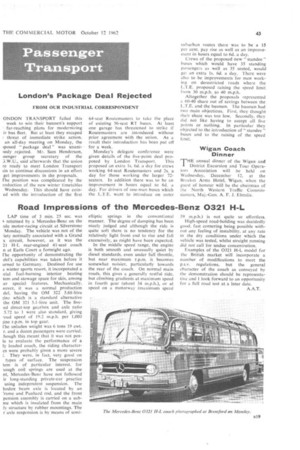London's Package Deal Rejected
Page 45

If you've noticed an error in this article please click here to report it so we can fix it.
FROM OUR INDUSTRIAL CORRESPONDENT ONDON TRANSPORT failed this week to win their busmen's support far-reaching plans for modernizing jr bus fleet. But at least they escaped threat of immediate strike action, an all-day meeting on Monday, the rposed "package deal" was unaniiusly ,rejected. Mr. Sam Henderson, ;senger group secretary of the 3.W.U., said afterwards that the union re ready to meet London Transport Lin to continue discussions in an effort get improvements in the proposals. he position was complicated by the roduction of the new winter timetables Wednesday. This should have coined with the introduction of the first 64-seat Routernasters to take the place of existing 56-seat RT buses. At least one garage has threatened to strike if Routernasters are introduced without prior agreement with the union. As a result their introduction has been put off for a week.
Monday's delegate conference were given details of the five-point deal pro
posed by London Transport. This proposed an extra Is. 6d. a day for crews working 64-seat Routemasters and 2s. a day for those working the larger 72seaters. In addition there was to be an improvement in . hours equal to 6d. a day. For drivers of one-man buses which the L.T.E. want to introduce on outer
suburban routes there was to be a 15 per cent, pay rise as well as an improvement in hOurs equal to 6d. a day.
Crews of the proposed new " standee " buses which would have 35 standing passengers as well as 35 seated, would get an extra Is. 6d. a day. There were also to be improvements for men working on derestricted roads where the L.T.E. proposed raising the speed limit from 30 m.p.h. to 40 m.p.h.
Altogether the proposals represented a 60-40 share out of savings between the L.T.E. and the busmen. The busmen had two main objections. First, they thought their share was too low. Secondly, they did not like having to accept all five points or nothing. In particular they objected to the introduction of " standee " buses and to the raising of the speed limit.




















































































































